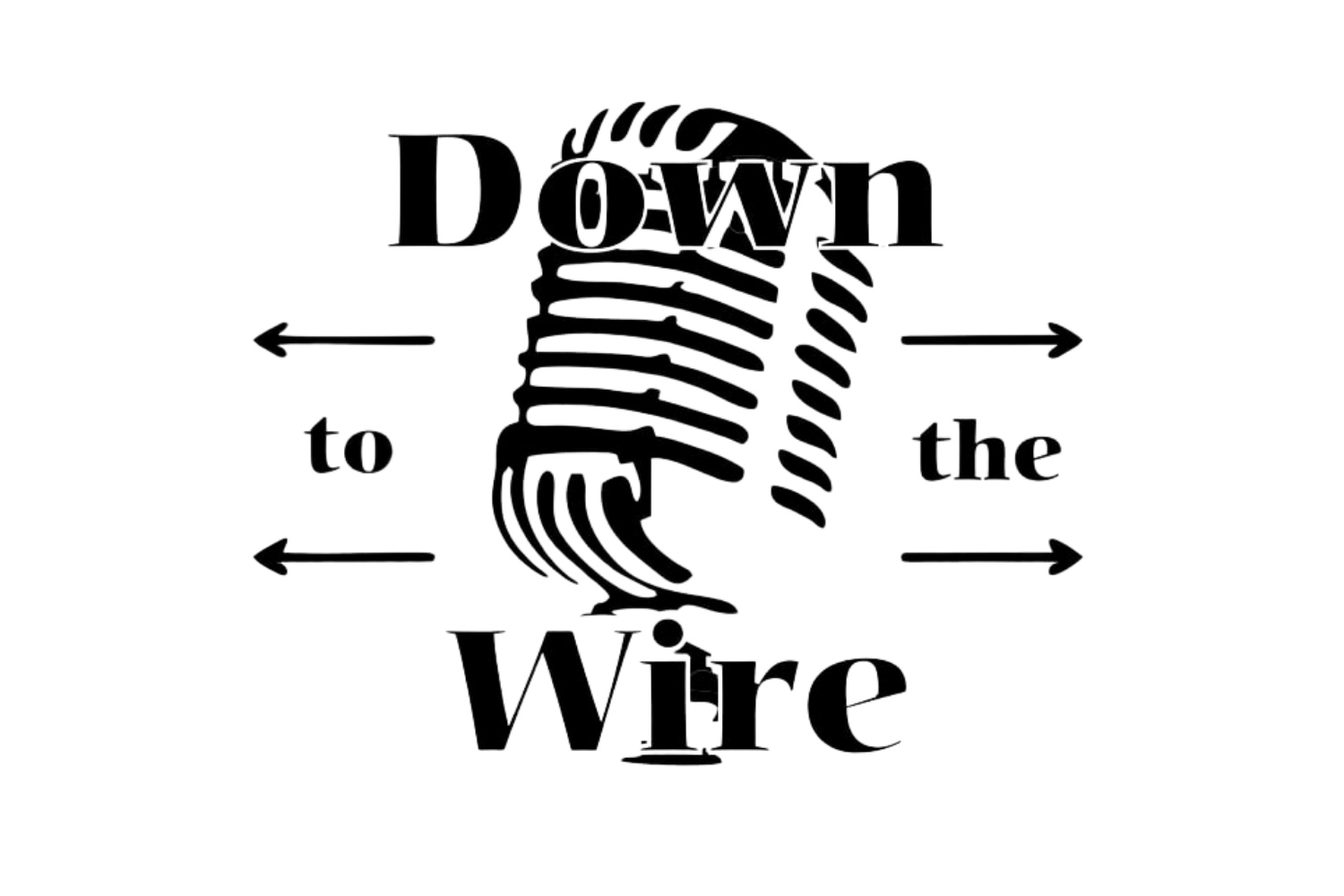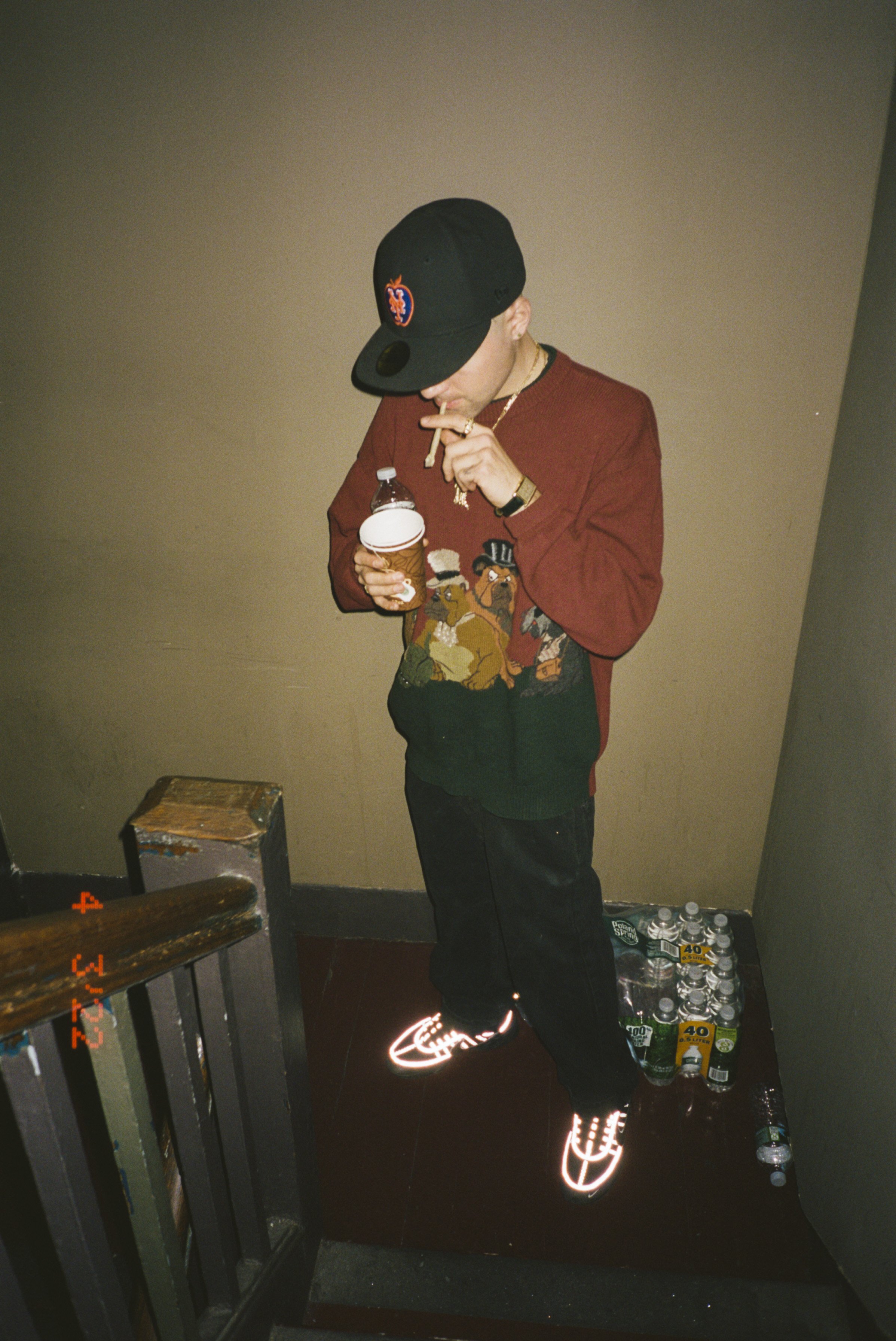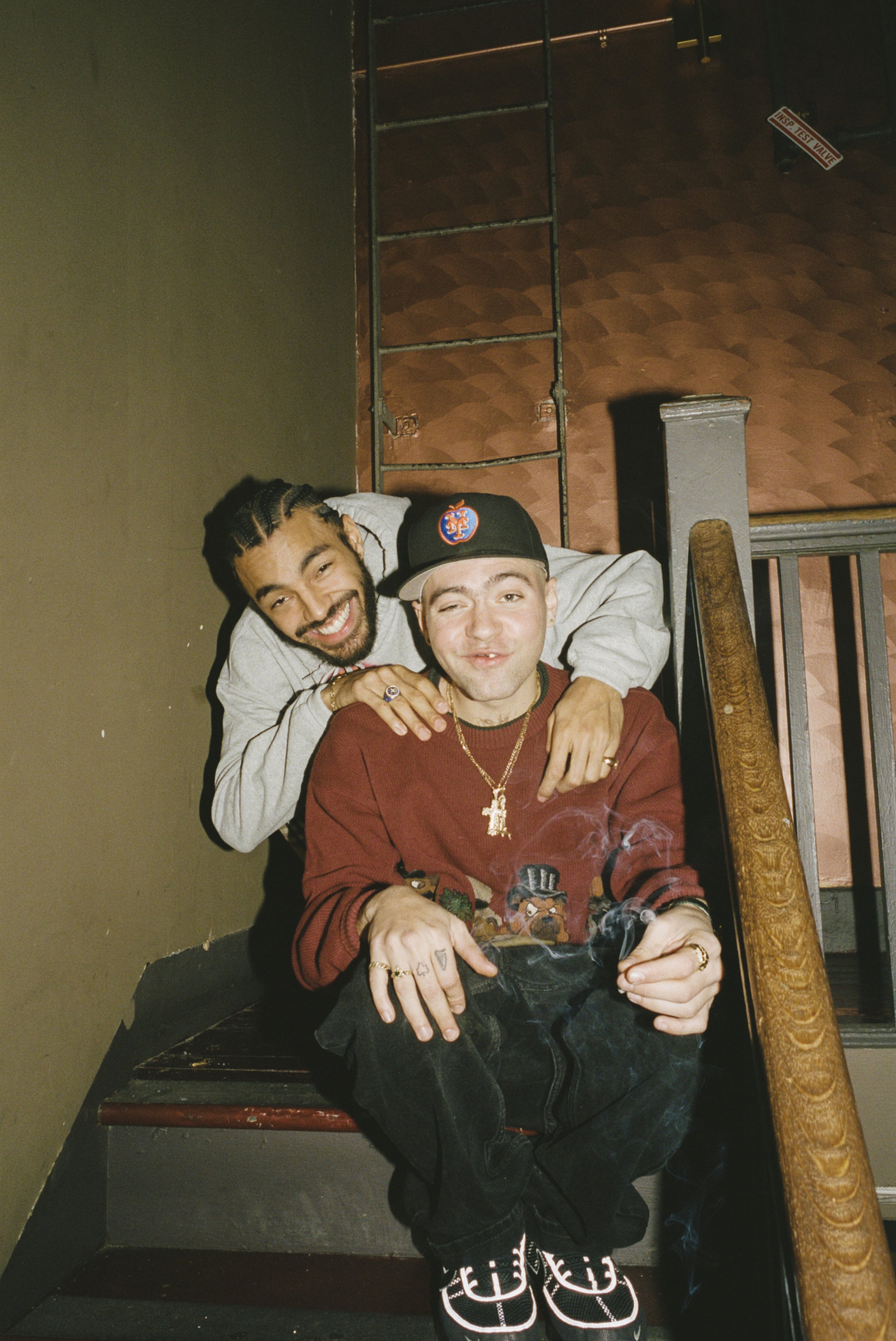Wiki: “I’m just starting out; Half-God to me is like my first album”
By Noah Snieckus
Back in 2019, The New Yorker published a feature titled ‘Wiki Goes from Young Rap Star to Grizzled Veteran’. The piece attributed recent past-tense parables to a rapper washed over by a mist of henny, jennies and the disillusionment that followed his boisterous boyhood and an unactualized start to adulthood. But the issue with this vague, overcast generalisation was that the fast-paced industry that they accounted as having caught Wiki in its rapids was the exact reality he was actively pushing against.
New York contemporaries, during that time, were making newspaper headlines for non-creative extravagancies – such as ASAP Rocky who was arrested after a physical altercation in Sweden and Jay Z trumpeted as hip-hop’s first billionaire. You’d more likely have found Patrick G. “Wiki” Morales lying low, feet up on a cobbled rooftop penning bars, recording with heavyweights like Skepta or Navy Blue in his home studio, or simply popping to K&K — his local bodega — for snacks and supplies. Wiki is the rapper without frills, and his raw passion for music is exactly what dismisses societal, and the press’s, ideals for artistic progression. And it seems as if Wiki, particularly since the initial 2020 lockdown, has proven to doubtful speculators that his time hasn’t passed but is yet to come!
Characteristic dissociation, of many within the public-eye, is commonplace. These celebrity-esque figures who have elevated to socialite positions are admired for the glitz-and-glamour of their lifestyle, of their looks, even of their talent… The perception of popular musicians is often that they are somehow superior to the average civilian, and subsequently the artist and the person often become indistinguishable in the eyes of fans and observers. Of course, this can be pressure-bearing to the hordes of celebrities and creatives whose golden ticket is purely a persona, or alter-ego – a character that they switch on and off. Wiki, unlike many artists, is the rapper he performs under on-and-off stage. Wiki is Wiki. A passion so innate and deep-rooted that it seems some way along the decade-plus years he has been rapping, it has become inseparable from his being.
New York artist Wiki (Shot by Alex Hodor-Lee)
In fact, when recalling life before rap in a 2016 interview, his answer was so vaguely fragmented, almost impatiently returning to the topic at hand (post-rap), that it was wrapped in a sentence: “Just running round the neighbourhood: bagels and cream cheese and lox... going to the park, Riverside park, playing basketball, you know. But, then rap. Yea, then I started rapping.”
Saturday the 21st of May was grey and especially tenebrous. That is because a ferocious ‘derecho’ had hacked through Ottawa — and the majority of Ontario — earlier that afternoon. The “widespread, long-lived, straight-line wind storm” cut out a good part of the city’s electricity; sending trees and telephone wires toppling; and costing the lives of at least eight people. Nonetheless, Wiki was set to perform at the SAW Gallery in Ottawa. I arrived for his set – which, as he posted, would commence at 7:30 – later than I would’ve wished, around 7:45. Thankfully, the schedule of a venue of this sort is normally more lax than to-the-minute so he hadn’t come on yet.
The venue’s performance space is artistic, as you’d expect, and tastefully modern. A site that, until its multi-million-dollar renovation at the latter half of 2018, was closer to the eerie basement of a South London Boiler Room. It had even been described as “a dark, awkward area at the bottom of a dark, narrow staircase” by a local reporter of the day rather than the airy, experiential, multi-disciplinary hub it has become. His DJ and in-house producer Subjxct 5 was spinning classics and acting as the echoing call-and-response hype man as folks began stepping in. It seemed as though all it took was Jay Z’s “This Life Forever” to attract the masses as the lights transposed from a disco-pink to a grungy-green.
“Straight out of Upper-West Side New York City” caused a chant to rise for Wiki’s entrance, which didn’t take much for a performer that could be seen rearing to go at the stage’s side-lines. Soulful production of Navy Blue blared from the sound system as the skittering drums trailed closely behind: he opened with “Roof”, one of the top takes from 2021’s Half-God. When one watches Wiki, it isn’t long before they get the sense that this is an artist who truly lives through his craft. Performed with a definitive cadence, though not rigid in delivery, a sustainable tone and masterful pacing, the song sounded as close to the published record as it could. In the short space between tracks, he asked the crowd “is the restriction still a thing [here]?” to a widely-unmasked crowd’s delight. “Nah, I aint taking no sides here. I’m just asking, is that a law? There’s no gate here; Come on, bring it in!”
The pluck of an electric bass was teased out of the speakers atop an opening punchline that hung before the beat dropped: “It all started with Party & Bullshit[‘s]” referencing rap hall of fame’s Biggie Smalls’ ‘93 hit as well as yet another New York reference — “New Truths” was run through. The transition between the latter was accented by a call-and-responsed “Yurrr” and was smooth enough to gain a vocal appreciation of Punk fans. Straight into “The Business”. Perhaps the most gritty sound of the evening, he seemed to pace through it with ease – though the track is quite the opposite in the atmosphere it creates. Wiki’s movements were loose and erratic, yet somehow smooth and ecstatic; repeatedly taking off his hat as a street-performer may to accept change. Though the only recompense Wiki seems to find satisfactory is in his own bar-laden execution.
Shot by Alex Hodor-Lee
Wiki is at his sharpest over live, instrumentally-infused beats – an exemplar of the cross-road point between the origins of rap, and a modern take through a man coming up in a similar reality decades on, but with the co-mixing pressures of modernity. So, it's passingly disheartening to hear an ode such as the one he dragged from his unreleased discography – almost an attempt to experiment outside of that which makes Wiki so special. That being said, as Wiki remarked, it's purely an example of self-expression: “If you’ve never went through that then you gotta go outside, or go on Tinder or some shit; I be falling in love every day on the train man!” And the concept of artistic self-expression is only commendable. Though, maybe a single to reconsider for performances such as these (a room where the average attendee is closer to ‘Slash’ than skater; Dude than dudette).
I wish I could pinpoint tracks that stood out in their reception. Ironically, the several other unreleased joints he laid down were hits amongst the audience; just to get a sense of how unfamiliar most were to Wiki’s discography. Though, if fans initially came for Iceage, they stayed for Wiki. And his performance was as solid and heartfelt as if they knew it word for word.
After his set had come to an end, he appeared from behind the backstage curtains and down the corridor with an accomplished bound. Wiki, to some degree, expected the congratulatories artists tend to receive after a good performance, but seemed almost surprised when I asked him for a sit down. With a wry smile signalling to Subjxct, whom he wasn’t aware I had just spoken to: “Ay yo we doing interviews out here?” He led the way to the smoker’s corner, which, at the SAW Gallery, is more a patio than the dampened patch of concrete you might find hipsters huddled on in a low-key venue such as this one.
Sat to my side now — sporting a New York Giants bent-flat-peak, an unbranded basketball jersey, slouched denim shorts (somewhat brushing the ¾ spectrum) and some well-worn Con’s — Wiki would slot in as one of Big Pun's crew members with ease; fitting considering he is one of Wiki’s top 5 rappers. He sprung into a tangent that took me a minute to catch onto: “You know like there’s Euro-fiends?” Pausing to think and tear the worse-for-wear spliff he had back-strapped while walking out: “The fiends here man, like there are fiends – but they’re low-key.” I have now come to realise this was in reference to the chick who interrupted our conversation to ask for a cig. But before long, a further string of now-Wiki supporters — fascinated by the New Yorker — approached, two of which interactions were particularly notable. The first had a simple intention: To express that he’s a “Big fan bro”. But Wiki’s brash wit: asking the two fellows, and signalling to his DJ, “Subjxct 5 is a problem - how’d you say five in French?” To their “Uhh... Cinq,” produced the bia-lingual moniker “Subjxct Cinq up in this bitch” – tying in two aspects of his character — cultural awareness and the brass persona of a New York native, of a NYC rapper for that matter.
The second was with a man who “Hooked [him] up with the loud.” He was French and didn’t speak much English: when Wiki asked him if he enjoyed the set, his response was “Yea, you good man.” Wiki seemed amusedly interested in the French and its influence in the city. Smiling at the cultural — and linguistic — disconnect of his interactions with Francophones. “They be mad French out here! I was curious if there was tension within the city – You know how you go to Dublin and everyone’s all happy, then you go Belfast and people are weird?” he relit his joint with a smug smile, “It’s like, which side are you on?”
His cultural curiosity could be from an internally-driven wonder. Raised in the Upper-West side of Manhattan with paternally-Puerto Rican roots, Irish ancestry on his mother’s side “and a little Italian too,” Wiki’s being is a melting pot of these influences. Such takes are similarly orchestrated through the broad spectrum of his musical and creative endeavours, but with more definite lines, where each element cohabits individually within a space. Take his three-piece 2021 streetwear drop with Warrior Shanghai, for example. Most sought after, the low-top sneakers are coloured Irish orange-and-green, positioned within the shape of a Puerto Rican flag, and in collaboration with a traditional Shanghai brand (founded in the 1930s), with the streets of Chinatown – Wiki would run around throughout his adolescence – in mind.
In further detailing his Irish background and subsequent connections, he said that when performing there, he came to better understand that “Ireland is still a very Irish place, and it’s not the most immigrant community. [But] when I go there and I rap my ass off, now all of the sudden they love that I’m Irish! Because I rep it.” He explained this fickle nationalism under the premise that, since his mother is American-Irish, Irish, as a people, half-jokingly say “you ain't really Irish!” Similarly, he added that “It’s the same with Rej [Rejjie Snow], he’s from Dublin for real for real, and I love that because it also shows the diversity of Dublin because… first of all the biggest rapper should be a black rapper, and [the fact] he’s from Dublin - hell yea! I fuck with that.”
I mentioned to Wiki that those connections, to Rejjie and his companions, were how I came across him in 2016, when I began listening to a variety of London’s underground rappers: Jadasea, King Krule – under his rap moniker Edgar The Beatmaker, and Jesse James. “Jadasea! That’s my peoples [nods to Subjxct] he got joints with Jada now. Subjxct 5, you heard that shit? When we was out there we was linking up, I was connecting the dots.” In an interview, Wiki expressed his feelings for England’s capital, in that: “London’s kind of like my second home. I feel like because I’ve been going out there for years, laying the groundwork and shit so I got mad people out there. It’s similar to New York.”
The occurrences leading up to the initial connection are fairly intriguing as an insight into a scene that’s artists, whether purposefully or not, chose to keep happenings and personal information on the low. Just as it isn’t often that an artist from overseas is so easily embraced and integrated into a – at the time – particularly tightly-knit, almost secluded scene: “Me and Archy” (he rethought) “Me and King Krule were on the same label. So he wasn’t even playing as King Krule, he was opening for Rat King as [Edgar the Beatmaker?, I asked] Nah - back then it was DJ JDSports – for us, and then we all just kicked it after. And me and Hawk were like ‘Yo we gotta stay here longer.’”
London’s underground scene, particularly around the time that Wiki was actively contributing, was a hub of out-of-the-box creative brilliance, only elevated by its retrospect, which seemed to be perpetually reinforced by its network of participants. Though fellow emcees like Crave Moore and Jesse James could be seen in early-2013 warming up for Kendrick Lamar, and Rejjie Snow’s Rejovich release just months later overtook rap heavyweights Kanye West and J. Cole in the official charts, the aforementioned scene was severely underground in respect to the wider music ecosystem.
As well, with a sound that straddles the old-school and the old-old-school, a prime example of tradition and the talent – though sometimes with such great prevalence of historic-inspiration that one could become lost in the mix – could reflect a rejection of the modern, commercialization of rap. I asked for his opinion on the UK-inspired New York drill, and whether he’s opposed to it, maybe in its unwillingness to stay true to more ground-level hip-hop? But, instead, he is an aficionado of its progressiveness: “Nah I love that shit! I love how it’s like: ‘You can sample anything’. In New York, even in the downtown bullshit scene... It’s like post-cool. There’s no ‘too cool’ for shit anymore, you know?’ Though, he admits that the means by which producers have approached sampling has caused a certain level of saturation in sound. Regardless, Wiki seems enthused by the direction that samples are allowing music to travel in – the way in which music is being approached. Generally, “New York takes itself so seriously all the time. And finally, it’s like ‘Fuck it.’ Have fun and make music.”
That optimism shone brighter at his show than his previous interviews may have suggested. Wiki says that, in the past when filling the role as ‘warm-up act’, he would get “real negative” with the mindset that: “‘Ahh motherfuckers ain’t out for me’, in my head you know? But I felt good about it the whole time.” Even on his 2019 project, Oofie, there seemed to be an introspectively bleak gloom that shadowed the LP. Tracks with titles such as ‘Downfall’ and ‘Grim’, with gritty, yearning samples, longed for that which is greater, for that which was. But with ‘Never Fall Off’ and ‘Still Here’ from his most recent album, Half God, hope is projected through a tone of slow-but-sure actualisation – the inner-strivings of an artist with purpose. One actively chasing that which, on previous works, were only flickering day-dreams from a tar-papered and gravel rooftop.
There’s a lyric in Wiki’s ‘Roof’ where he ponders, “Do I really want shows to come back? I don’t know. That’s the only times I feel real - the times that I rap”, which brings into question whether an artist can uphold the same kind of excitement when performing now as they did the decade plus before, when they started out. But Wiki feels this more so than ever: “I feel more excited! I’m more in control as an emcee live now, so it’s fun to rap. Like even if I went to go hear my old joints [there’s a] difference in breath control. I’ve been rapping live for like 10 years now so it’s like [turns to Subjxct] you hear me get better every show! I lightened my voice a little bit tonight... I was like: ‘Alright, I’m confident, it’s good out there. If I don’t hear myself perfect on stage, whatever. I know it’s good out there.”
Wiki is a rapper! No story he told or tangent he tailed off on didn’t include at least detailings of rap and the endeavours that have followed since the times of his short-lived, 8th grade rap duo ‘Wiki and Googs’. From the chronicles of meeting King Krule, to performances in far-flung lands, to Glastonbury/recording with Skepta. It’s a rarity to gain a sense when talking with someone that this is what they were ‘born’ to do. Still, Oofie was lambasted by the New Yorker as “a document of disillusionment,” instead of approached with the more empathetic take a creative might draw: that the reflection was necessary for that which lay ahead in its assimilation. But if this rash statement was the case, then last year’s Half God is a distilled diaspora from in-depth digestion – Wiki’s debut, as he sees it. It seems as though he has stepped into a new space artistically – as he travels from venue to venue providing sonic performances worthy of headlinings. Wiki, most importantly, is enjoying music now: “I’m just starting out. Half-God, to me, is like my first album…It’s like a new time in my life and shit.”
Shot by Alex Hodor-Lee




